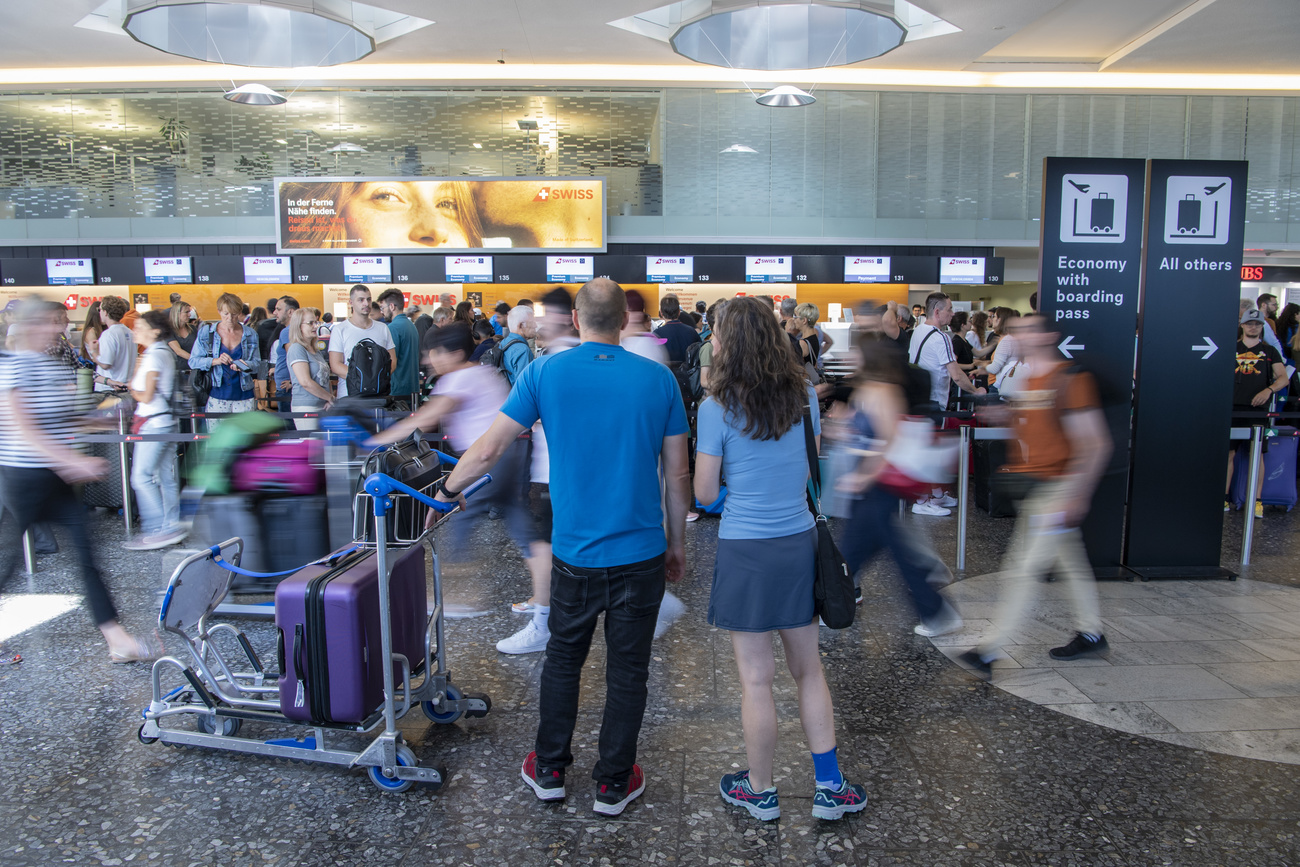
The Swiss Abroad in nine charts

The number of Swiss people living abroad continues to increase, and many have more than one passport. Nine charts explain their characteristics and geographic distribution.
+ Articles focusing on the Swiss Abroad
In the last decade, roughly 30,000 Swiss have emigrated each year on average. By the end of 2024, 826,708 citizens – equivalent to nearly 11% of all Swiss nationals worldwide – were living abroad, according to the latest figuresExternal link released by the Federal Statistical Office. This total represents 80,000 more expatriates than ten years ago, and 320,000 more than in 1993.
Between 2023 and 2024 alone, the Swiss diaspora grew by almost 13,000 individuals, increasing worldwide except Latin America, where it remained stable.
+ Everything you need to know about the Swiss Abroad
The rising trend is only partly due to expatriations; naturalisations and the birth of Swiss babies abroad have also contributed to this figure.
Almost two-thirds of Swiss Abroad live in Europe
About 64% of expatriates live in Europe, primarily in neighbouring countries. France, with 212,100 Swiss residents, is home to the largest community, followed by Germany and Italy. Emigration figures for 2019 confirm this top three ranking: 19% of all Swiss emigrants went to France, 11% to Germany and 6% to Italy.
The United States is the 4th most popular destination for Swiss nationals, accounting for 5% of emigrants. Outside Europe, the largest community of Swiss Abroad (84,700) lives in the United States. In Latin America, Argentina claims the greatest number of Swiss (15,100), followed by Brazil and Chile. On the Asian continent, Israel has the greatest number of Swiss Abroad (24,400), ahead of Thailand. In Oceania, the Swiss live primarily in Australia (26,600). In Africa, they concentrate in South Africa (7,700).
If you have problems displaying the map, click hereExternal link.
More women than men
Over the past decade, slightly more Swiss men than women have emigrated: each year, they account for an average of 52% of emigrants.
However, women make up a slight majority of the diaspora (54%, compared with 46% of men). The fact that people are born Swiss or acquire Swiss nationality abroad probably explains this difference, which can be seen in the number of men and women in the diaspora.
In the Vatican, however, where the papal Swiss Guard is an entirely male military corps, virtually all of the 158 Swiss expatriates are men.
Young adults are most adventurous
The 20-35 age group is the one in which the most Swiss emigrate (one third of the total). A second wave of emigration is seen among senior citizens: 20% of all emigrants are aged 55 to 69.
>>>Many Swiss emigrate when they reach retirement age to escape financial hardship, as this article explains:

More
‘With my pension money I can’t live in Switzerland’
Extremes of the age pyramid
The majority of Swiss Abroad (55%) are of working age. Roughly one expatriate in five is less than 18 years old, and almost one in four is 65 or older. Pensioners make up the cohort that has grown the most in recent years (+4% between 2023 and 2024 like in the previous year).
Thailand, Portugal, Spain, and South Africa are notable for the high proportion of retirees in their large communities of Swiss Abroad. In Thailand, the average age of Swiss expatriates is 55, whereas the global average is 43. Between 2023 and 2024, the proportion of Swiss senior citizens have increased particularly in Portugal and Thailand (+16% and +7% respectively).
On the other end of the spectrum, Israel has by far the youngest community of Swiss Abroad: nearly half of the Swiss in Israel are minors, and the average age is 27.
Three cantons account for half of emigrants
A glance at the cantons of origin of Swiss emigrants shows the predominance of Zurich, Vaud and Geneva. Taken together, these three urban and globalised cantons accounted for almost half of all Swiss emigration recorded between 2019 and 2023.
This has more to do with their population than anything else. Even allowing for the fact that Zurich and Vaud are among the most populous cantons, they remain over-represented. This is even truer of Geneva: 13% of Swiss nationals who emigrated resided in the small canton, which is home to just 5% of the country’s population.
The majority actually stayed in the ‘Greater Geneva’ area, but on the French side. According to the organisation Genevois sans frontières, the housing crisis in the canton pushes between 2,500 and 3,000 Geneva inhabitants to move to neighbouring France every year. A high number, given that a total of 3,700 people emigrated from the canton of Geneva in 2023.
Bern, on the other hand, is the second most populous canton (13% of Swiss nationals live there), but was the canton of origin for only 8% of emigrants.
Three-quarters of Swiss Abroad have more than one passport
Three-quarters of Swiss expatriates are also citizens of at least one other country. But the prevalence of dual (or multiple) citizenship varies widely among the host countries. Thailand has the highest percentage of Swiss with no other nationality. In contrast, virtually the entire Swiss diaspora in Argentina has more than one passport.
Around half of those who emigrated return
The FSO has studied the migration trajectories of a cohort of people between 2011 and 2022. To date, these are the best statistics available to give an idea of the length of time that Swiss who choose to emigrate stay abroad.
They show that more than half of the Swiss nationals who emigrated from Switzerland in 2011 will be residing there again in 2022 – with significant variation depending on their place of birth. People born in Switzerland return home more often than those born abroad (with a return rate after 11 years of 56% compared with 40%).
The period of emigration also tends to be shorter for people born in Switzerland: more than a third returned to Switzerland within three years of leaving, compared with less than a quarter of those born abroad.
Is the call of a new life stronger than homesickness?
The fact remains that, every year, more Swiss people take the plunge to live abroad than come to (or return to) settle in Switzerland. The year 2020, marked by the Covid-19 pandemic, was the only exception in the last 30 years. But since then, expatriation numbers have been on the rise again.
In 2023 (the latest year available), almost 31,000 Swiss nationals left Switzerland, and around 22,000 returned.
What is your opinion? Join the debate:
Adapted from French by K. Bidwell/gw/ac

More
More and more Swiss are living abroad

In compliance with the JTI standards
More: SWI swissinfo.ch certified by the Journalism Trust Initiative






































You can find an overview of ongoing debates with our journalists here . Please join us!
If you want to start a conversation about a topic raised in this article or want to report factual errors, email us at english@swissinfo.ch.